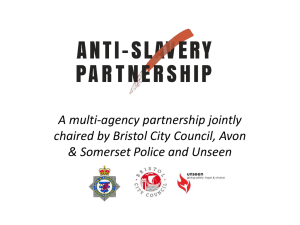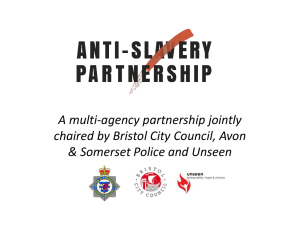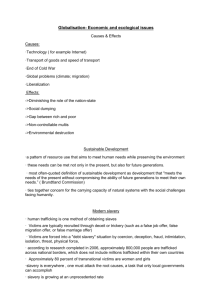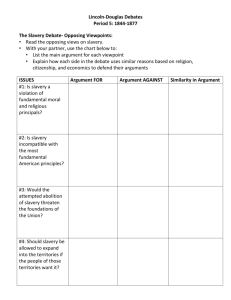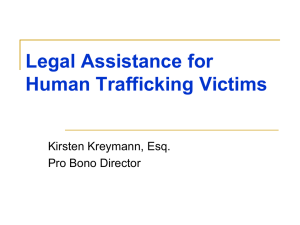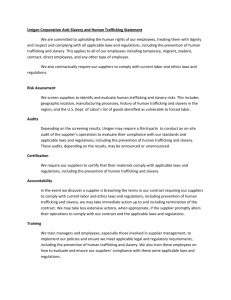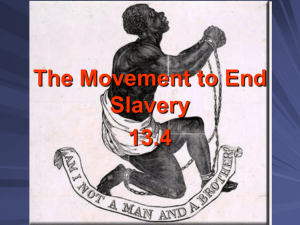Archbishops Council corporate template
advertisement
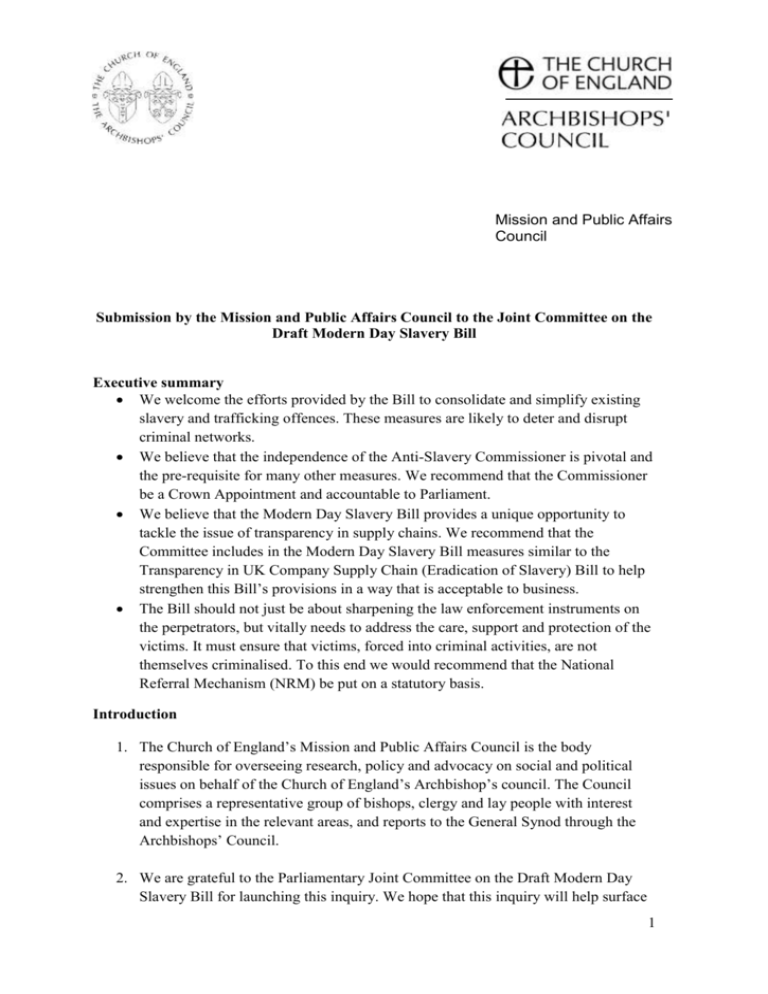
Mission and Public Affairs Council Submission by the Mission and Public Affairs Council to the Joint Committee on the Draft Modern Day Slavery Bill Executive summary We welcome the efforts provided by the Bill to consolidate and simplify existing slavery and trafficking offences. These measures are likely to deter and disrupt criminal networks. We believe that the independence of the Anti-Slavery Commissioner is pivotal and the pre-requisite for many other measures. We recommend that the Commissioner be a Crown Appointment and accountable to Parliament. We believe that the Modern Day Slavery Bill provides a unique opportunity to tackle the issue of transparency in supply chains. We recommend that the Committee includes in the Modern Day Slavery Bill measures similar to the Transparency in UK Company Supply Chain (Eradication of Slavery) Bill to help strengthen this Bill’s provisions in a way that is acceptable to business. The Bill should not just be about sharpening the law enforcement instruments on the perpetrators, but vitally needs to address the care, support and protection of the victims. It must ensure that victims, forced into criminal activities, are not themselves criminalised. To this end we would recommend that the National Referral Mechanism (NRM) be put on a statutory basis. Introduction 1. The Church of England’s Mission and Public Affairs Council is the body responsible for overseeing research, policy and advocacy on social and political issues on behalf of the Church of England’s Archbishop’s council. The Council comprises a representative group of bishops, clergy and lay people with interest and expertise in the relevant areas, and reports to the General Synod through the Archbishops’ Council. 2. We are grateful to the Parliamentary Joint Committee on the Draft Modern Day Slavery Bill for launching this inquiry. We hope that this inquiry will help surface 1 the scale of this hidden and pernicious practice and the steps that Parliament can take to abolish it entirely. Two hundred years after William Wilberforce’s success in abolishing the slave trade, it is simply unacceptable that slavery continues today in so many forms – bonded labour, child slavery, early and forced marriages, descent based slavery, forced labour and human trafficking. The Government’s commitment to legislate in this area provides Parliament with an opportunity to agree a robust set of measures that set the standard for the rest of the world. 3. This submission is informed by a consultation on human trafficking and modern day slavery held at Lambeth Palace in December 2013. This consultation involved a number of faith and voluntary groups working in differing local contexts to combat modern day slavery. This work often involves training community networks to notice and respond to signs of enslavement as well as liaising with statutory agencies in the provision of pastoral support to victims. 4. The Mission and Pubic Affairs Division of the Archbishop’s Council is working to develop a practical strategy for tackling the impact of modern day slavery by focussing on prevention, pastoral care and re-integration. The Church is working with the Anglican Alliance for Relief Development and Advocacy to develop an international Anglican network to help provide a more coordinated response to this global phenomenon. We also acknowledge and are drawing on the long standing experience of the Catholic Bishops Conference of England and Wales. 5. Underpinning the Church’s response to modern day slavery is the recognition that this most wicked of practices is incompatible with the dignity and worth of the human being. It is a crime that must be clearly condemned and prosecuted. As a Church we find it unacceptable that the conditions of global poverty are so exploited that human beings, lovingly created in the image of God, are treated like chattels to be traded at the highest price for the self-enrichment and betterment of others. Codification of existing offences 6. We welcome the efforts provided by the Bill to consolidate and simplify existing slavery and trafficking offences. We also welcome the proposals to introduce new forms of civil orders to enable prohibitions to be imposed by the courts on individuals convicted of a slavery or trafficking offence or on individuals where there is evidence that the individual is posing a risk of causing another person to be a victim of slavery or trafficking for exploitation. We believe that these measures are likely to deter and disrupt criminal networks. 7. We also welcome the steps set out in Clause 35 of the Bill imposing a duty on specified public authorities to notify the National Criminal Agency where they have reasonable grounds to suspect that a person may be the victim of human trafficking. We note however that if this clause is to work as intended, namely to 2 address the current low rates of identification, then it will be necessary for those specified public authorities to develop suitable training programmes to assist their staff to undertake this duty. We would also recommend that this duty to refer is audited by relevant bodies. Anti-Slavery Commissioner 8. We welcome the Home Secretary’s decision to include in the Draft Bill measures to establish an Anti-Slavery Commissioner. We believe that if properly established the new Anti-Slavery Commissioner can make a significant contribution in the UK’s fight against this crime and in giving a voice to the concerns and welfare of victims and survivors of modern day slavery. The Commissioner needs to be able to speak across all parties, able to give voice to victims, provide strategic leadership to combat modern slavery and, when necessary, launch inquiries and publish findings to collectively tackle the issue and hold all persons working in this area accountable. If the post of Commissioner has sufficient coordinating power, then many other measures set out in the Draft Bill become possible. 9. To enable the Commissioner to take forward this work we believe that a convincing case exists for the Commissioner to be a Crown Appointment held accountable to Parliament through recourse to an annual report. With so many government departments, local government agencies and NGOs working in their own disparate ways to combat modern slavery we suggest that such arrangements would help provide the necessary leadership to provide a coherent response. 10. We would welcome the Committee looking further into this issue. The existing provisions of the Draft Bill risk politicising the Office and circumscribing the powers of the Commissioner to encourage good practice in the prevention, detention, investigation and prosecution of offences as set out under Part One of the Draft Bill. If the Commissioner needs to be located in one Government department, would it not make more sense to locate the Office with the Ministry of Justice rather than the Home Office? Transparency in Business supply chains 11. If we are to tackle modern slavery effectively any response must include and empower business to ensure that there is no slavery in their supply and product chains or business practices – there is no possible way to eradicate modern slavery without them. We believe that the Modern Day Slavery Bill provides a unique opportunity to tackle the issue of transparency in supply chains and we are disappointed that the draft Bill does not do more. 12. We recognise the business sensitivities about legislating in this area and accept that the matter is more complex than many let on. However, we believe many of the measures in the Transparency in UK Supply Chains (Eradication of Slavery) Bill provide a possible way forward. This Bill required businesses with a global 3 turnover greater than £100 million to note on their websites and their annual reports what they were doing - even if that amounted to nothing - to respond to the possibility that there could be slavery in their supply chains. 13. This Bill, based on the California Transparency Supply Chains Act of 2010, was drafted in this way precisely because it was acceptable to most businesses as it provides a level playing field for all. It provides an entry point into a debate that is often unhelpfully polarised and entrenched. We understand that in practice in California this simple reporting requirement has resulted in hundreds of firms taking their first step toward addressing this issue. 14. We accept that the inclusion of some similar measure within the Modern Day Slavery Bill will not in itself solve the problem of slavery in supply chains, but it would represent an important strategic first step. Supporting the rights of victims 15. Much as we welcome efforts to consolidate and simplify existing slavery and trafficking offences the Bill should not just be about sharpening the law enforcement instruments on the perpetrators. It vitally needs to address the care, support and protection of the victims. It must ensure that victims, forced into criminal activities, are not themselves criminalised. 16. We recognise this is difficult to achieve in legislation without creating a carte blanche immunity from prosecution which would create the potential for abuse. In order to try and address this point we would like to see the National Referral Mechanism (NRM) put on a statutory basis within legislation and for it to become a two stage process with mandatory reporting by all designated first responders and a part two if the adult victim wished to access services. All children must, as is currently the case, be entered into the NRM. 17. It is important to ensure that victims of modern slavery are able to access legal services, particularly in relation to complex issues such as their immigration status or compensation claims. This is a vital aspect of victim support and fulfils the Government’s obligations under the European Union directive on trafficking to “ensure that victims of trafficking in human beings have access without delay to legal counselling, and, in accordance with the role of victims in the relevant justice system, to legal representation, including for the purpose of claiming compensation.” 18. The EU directive also provides that ‘legal counselling and legal representation shall be free of charge where the victim does not have sufficient financial resources’. In our submission to the consultation on legal aid (31st May 2013) we made the point that the exception made for victims of trafficking in the Legal Aid, Sentencing and Punishment of Offenders Act 2012 should be carried over into the 4 newly proposed changes to legal aid. We welcomed the Government’s response to the consultation, which exempted victims of trafficking from the 12-month residence test, but echo the concerns of the Joint Committee on Human Rights (published 13th December 2013, Sections 129-131), and their recommendations that all children should be exempted from the residence test, and that the Government's exemptions be extended to cases where the status of the trafficking victim is contested, and to legitimate challenges to failure to prosecute or investigate. 19. We recognise that a number of organisations advocate that specific measures to safeguard trafficked children including a system of legal guardianship, should be incorporated into the Bill in order to address weaknesses in the current system that frequently leave child victims at risk. We share their concern, but are conscious that the current system and application of the Children’s Act is not functioning as intended. These failings must be addressed as a matter of urgency. We worry that introducing a system of legal guardianship to the piece would be adding yet another layer to an already misfiring system. 20. Of greater priority, we feel, is the training of social services to recognise the signs of modern slavery and trafficking and the entering of children into the NRM. The need for safe and secure accommodation for trafficked children is a key missing component and without this there is every likelihood that guardians will end up being guardians of missing children. 21. Access to healthcare is essential for victims of modern slavery. Under the proposals in the current Immigration Bill, migrants who have not paid the immigration health charge will not be able to access free treatment within primary care services. We warmly welcome the exemption which is included for victims of trafficking. However, there are complexities and potential delay involved in the identification of people as victims, and the new system could create a risk that people will be anxious about presenting to services such as Accident and Emergency, if there are uncertainties about whether they will be asked to pay. 22. There is also a need to give more attention, through staff training and operational guidance and oversight, to the needs of people who may be victims of trafficking but are detained, for example by police or in immigration removal centres. A recent inspection report on Yarl’s Wood IRC (HM Inspectorate of Prisons, October 2013) found that referrals were not always made to the NRM when there were indicators of trafficking, and also that treatment did not take account of the issue: “Some women’s histories of victimisation before detention, for example because of abusive relationships or trafficking, meant that any experiences of insensitive or inappropriate behaviour by detention staff were amplified for them. There were too few female staff and women told us they were embarrassed by male officers carrying out searches of their rooms and personal property. Staff had 5 no specific training in recognising and managing the particular vulnerability of the female population.” 23. We very much hope that when taking forward its inquiry the Committee will look at ways in which the Draft Bill might strengthen the relationship between hard pressed statutory agencies and faith and voluntary sectors to ensure that best possible provision is made for the support of victims. The Metropolitan Police and Hope for Justice are doing some pioneering work here that the Committee could find helpful. Their work underlines that that this is a psychological issue as much as one of receiving adequate legal support. Trafficked victims tend to be so ‘institutionalised’ by the experience that any recovery requires a different kind of space and set of relationships, which faith and voluntary groups are best equipped to provide. Providing pastoral support and welfare assistance helps to restore the human dignity of those abused and build victims’ capacity to testify. Mr Philip Fletcher Chair, Mission and Public Affairs Council February 2014 Mission and Public Affairs Council Church House, Great Smith Street, London, SW1P 3NZ email: charles.reed@churchofengland.org Telephone: 07590 255999 6
